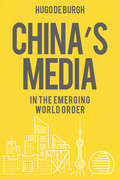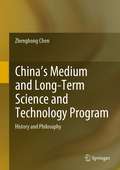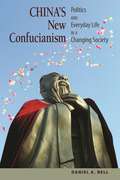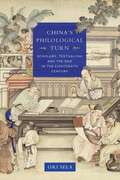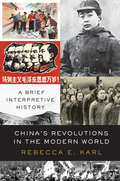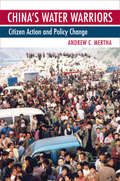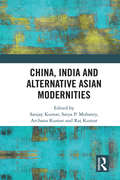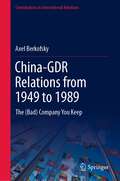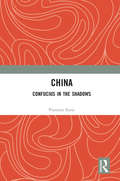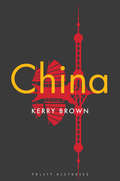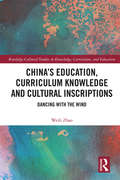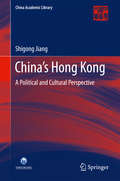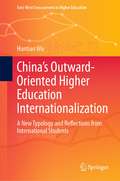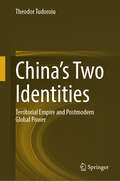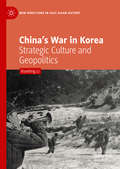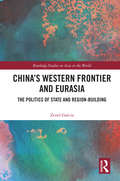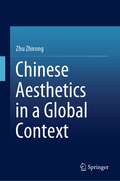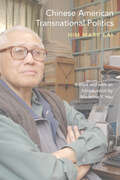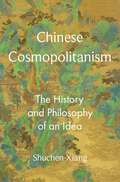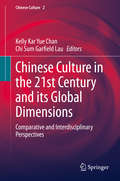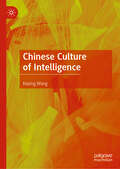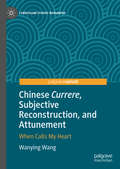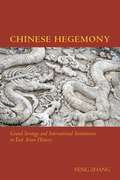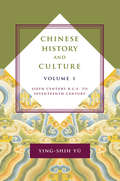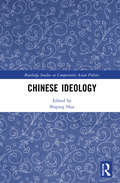- Table View
- List View
China's Media in the Emerging World Order: how they came to be a powerful new force in media (Internationalizing Media Studies)
by Hugo De BurghChina is challenging the mighty behemoths, Google and Facebook, and creating alternative New Media. 750 million people are active on its Social Mediascape and there are a billion mobile phones deploying the innovative apps with which the Chinese conduct their lives.Though late starters, already four of the world's leading New Media companies are Chinese. China's old media - television, newspapers, radio - challenge the established powers which were long thought unassailable, such as CNN and BBC. Produced in many languages on every continent, they are re-defining the agenda and telling the story in China's way, with not just news and documentary series but also entertainment. The world's biggest manufacturer of TV drama is now making its stories for export.China's Media tells you why and how. It investigates the Chinese media, their strengths and weaknesses and how they are different. from the West. This detailed and comprehensive guide aims to showcase their immense variety and diversity, and demonstrates how they came to be a powerful new force in the media world.
China's Medium and Long-Term Science and Technology Program: History and Philosophy
by Zhenghong ChenThis book conducts a panoramic study on the history of China’s Science and Technology which focuses on the Medium and Long-Term Science and Technology Program (MLSTP). In general these Programs have a duration of 5-30 year. This book provides an epochal assessment of the project’s conceptual context over the past 60 years.. The author shows that the historical evolution and conceptual development of China’s MLSTP are the result of an amalgamation of political, economic and social factors within distinct contemporary contexts. As a national action plan, MLSTP has incorporated many of the factors that go beyond the intentional factors of science and technology. MLSTP is not only a macro vision and blueprint for scientific and technological development; it is also a political act of realizing the national will. While ensuring the MLSTP builds on its great achievements, the author also reflects upon its deficiencies and disadvantages in order to better promote the advancement of science and technology in China.This book comprehensively lays out the historical and theoretical dimensions. Based on a clear vision of historical constructivism the author has compiled the MLSTP philosophy of different eras into a conceptual framework for this era and used this framework to research and analyze the historical and conceptual evolution of MLSTP. Research on MLSTP is important for as enrichment of contemporary studies in the history of science and the science and technology policy. In 2010, more than 60 years after the establishment of the People’s Republic of China, the country had enacted 10 MLSTP programs.This book separates the development of the MLSTP into three different historical eras: the era of economic planning, the era of economic transformation and the new century. Each historical epoch corresponds to a different MLSTP philosophy concept, which enables us to study the conceptual evolution of MLSTP using historical research as our foundation.
China's New Confucianism: Politics and Everyday Life in a Changing Society
by Daniel A. BellWhat is it like to be a Westerner teaching political philosophy in an officially Marxist state? Why do Chinese sex workers sing karaoke with their customers? And why do some Communist Party cadres get promoted if they care for their elderly parents? In this entertaining and illuminating book, one of the few Westerners to teach at a Chinese university draws on his personal experiences to paint an unexpected portrait of a society undergoing faster and more sweeping changes than anywhere else on earth. With a storyteller's eye for detail, Daniel Bell observes the rituals, routines, and tensions of daily life in China. China's New Confucianism makes the case that as the nation retreats from communism, it is embracing a new Confucianism that offers a compelling alternative to Western liberalism. Bell provides an insider's account of Chinese culture and, along the way, debunks a variety of stereotypes. He presents the startling argument that Confucian social hierarchy can actually contribute to economic equality in China. He covers such diverse social topics as sex, sports, and the treatment of domestic workers. He considers the 2008 Olympics in Beijing, wondering whether Chinese overcompetitiveness might be tempered by Confucian civility. And he looks at education in China, showing the ways Confucianism impacts his role as a political theorist and teacher. By examining the challenges that arise as China adapts ancient values to contemporary society, China's New Confucianism enriches the dialogue of possibilities available to this rapidly evolving nation. In a new preface, Bell discusses the challenges of promoting Confucianism in China and the West.
China's Philological Turn: Scholars, Textualism, and the Dao in the Eighteenth Century (Studies of the Weatherhead East Asian Institute, Columbia University)
by Ori SelaIn eighteenth-century China, a remarkable intellectual transformation took place, centered on the ascendance of philology. Its practitioners were preoccupied with the reliability of sources as evidence for restoring ancient texts and meanings and with the centrality of facts and truth to their scholarship and identity. With the power to construct the textual past, philology has the potential to shape both individual and collective identities, and its rise to prominence consequently deeply affected contemporaneous political, social, and cultural agendas.Ori Sela foregrounds the polymath Qian Daxin (1728–1804), one of the most distinguished scholars of the Qing dynasty, to tell this story. China’s Philological Turn traces scholars’ social networks and the production of knowledge, considering the texts they studied along with their reading practices and the assumptions about knowledge, facts, and truth that came with them. The book considers fundamental issues of eighteenth-century intellectual life: the tension between antiquity’s elevated status and the question of what antiquity actually was; the status of scientific knowledge, especially astronomy, mathematics, and calendrical studies; and the relationship between learned debates and cultural anxieties, especially scholars’ self-characterization and collective identity. Sela brings to light manuscripts, biographies, letters, handwritten notes, epitaphs, and more to highlight the creativity and openness of his subjects. A pioneering book in the cultural history of intellectuals across disciplinary boundaries, China’s Philological Turn reconstructs the history of eighteenth-century Chinese learning and its long-lasting consequences.
China's Revolutions in the Modern World: A Brief Interpretive History
by Rebecca E. KarlA concise account of how revolutions made modern China and helped shape the modern worldChina&’s emergence as a twenty-first-century global economic, cultural, and political power is often presented as a story of what Chinese leader Xi Jinping calls the nation&’s &“great rejuvenation,&” a story narrated as the return of China to its &“rightful&” place at the center of the world. In China&’s Revolutions in the Modern World, historian Rebecca E. Karl argues that China&’s contemporary emergence is best seen not as a &“return,&” but rather as the product of revolutionary and counter-revolutionary activity and imaginings. From the Taipings in the mid-nineteenth century through nationalist, anti-imperialist, cultural, and socialist revolutions to today&’s capitalist-inflected Communist State, modern China has been made in intellectual dissonance and class struggle, in mass democratic movements and global war, in socialism and anti-socialism, in repression and conflict by multiple generations of Chinese people mobilized to seize history and make the future in their own name. Through China&’s successive revolutions, the contours of our contemporary world have taken shape. This brief interpretive history shows how.
China's Water Warriors: Citizen Action and Policy Change
by Andrew C. MerthaToday opponents of large-scale dam projects in China, rather than being greeted with indifference or repression, are part of the hydropower policymaking process itself. What accounts for this dramatic change in this critical policy area surrounding China's insatiable quest for energy? In China's Water Warriors, Andrew C. Mertha argues that as China has become increasingly market driven, decentralized, and politically heterogeneous, the control and management of water has transformed from an unquestioned economic imperative to a lightning rod of bureaucratic infighting, societal opposition, and open protest. Although bargaining has always been present in Chinese politics, more recently the media, nongovernmental organizations, and other activists--actors hitherto denied a seat at the table--have emerged as serious players in the policy-making process. Drawing from extensive field research in some of the most remote parts of Southwest China, China's Water Warriors contains rich narratives of the widespread opposition to dams in Pubugou and Dujiangyan in Sichuan province and the Nu River Project in Yunnan province. Mertha concludes that the impact and occasional success of such grassroots movements and policy activism signal a marked change in China's domestic politics. He questions democratization as the only, or even the most illuminating, indicator of political liberalization in China, instead offering an informed and hopeful picture of a growing pluralization of the Chinese policy process as exemplified by hydropower politics. For the 2010 paperback edition, Mertha tests his conclusions against events in China since 2008, including the Olympics, the devastating 2008 Wenchuan earthquake, and the Uighar and Tibetan protests of 2008 and 2009.
China, India and Alternative Asian Modernities
by Satya P. Mohanty Sanjay Kumar Archana Kumar Raj KumarThe conception of modernity as a radical rupture from the past runs parallel to the conception of Europe as the primary locus of global history. The essays in this volume contest the temporal and spatial divisions—between past and present, modernity and tradition, and Europe’s progress and Asia’s stasis—which the conventional narrative of modernity creates. Drawing on early modern Chinese and Indian history and culture instead, the authors of the book explore the provenance of modernity beyond the west to see it in a transcultural and pluralistic light. The central argument of this volume is that modernity does not have a singular core or essence—a causal centre. Its key features need to be disaggregated and new configurations and combinations imagined. By studying the Bhakti movement, Confucian democracy, and the maritime and agrarian economies of China and India, this book enlarges the terms of debate and revisits devalued terms and concepts like tradition, religion, authority, and rural as resources for modernity. This book will be of great interest to researchers and academicians working in the areas of history, Sociology, Cultural Studies, literature, geopolitics, South Asian and East Asian Studies.
China-GDR Relations from 1949 to 1989: The (Bad) Company You Keep (Contributions to International Relations)
by Axel BerkofskyThis book provides an in-depth analysis of the relations between China and the German Democratic Republic (GDR) from 1949 to 1989. These relations were characterized by some “ups” but many more “downs,” e.g. when, in the early 1960s, the Soviet Union ordered its vassal state in East Berlin to begin treating its former socialist comrade and brother-in-arms as an adversary and indeed enemy. Drawing on a wealth of archival material, especially from the archive of the GDR’s ruling party, this book examines selected issues and elements of East German and Chinese domestic and foreign policy. In order to better grasp the nature and the historical context of the bilateral relationship, it offers detailed insights into the following aspects: 1. the bilateral “honeymoon period” from 1949 to the late 1950s, which was accompanied by the two parties supporting and applauding each other’s oppressive domestic and ill-fated economic policies, including Mao’s Great Leap Forward and the Cultural Revolution; 2. relations during the 1960s, when the “Sino-Soviet Split” defined the quality and level of bilateral animosities; 3. the 1970s, when Beijing replaced socialist comradeship with East Berlin with trade and aid from the US and West Germany; and 4. the resumption of Sino-East German relations in the 1980s and the subsequent period up to the Tiananmen Square protests and the collapse of the GDR in 1989. The book will appeal to historians, political scientists and scholars of international relations, as well as policymakers, diplomats, and others with an interest in this previously under-researched area.
China: Confucius in the Shadows
by Poonam SurieThe book is a study of Confucius and the Confucian philosophy of being non-confrontationist, benevolent and with values such as filial piety and harmony. It covers an array of themes including Qufu: Confucius Country, Music and Poetry across China, Chinese Foreign Policy, Philosophy and China’s Legal System. The book is beautifully illustrated as well as includes some enlightening photographs from the Confucius Museum in Qufu. It would be of direct interest to a variety of readers from Political /History/Sociology departments as well as the avid readers. Please note: This book is co-published with KW Publishers, New Delhi. Taylor & Francis does not sell or distribute the Hardback in India, Pakistan, Nepal, Bhutan, Bangladesh and Sri Lanka.
China: The Next Decade For The People's Republic Of China (Polity Histories)
by Kerry BrownChina is poised to become the world's largest economy in the next decade. But its great struggle to modernise has been one of tragedy, conflict, and challenge. From the first attempts to introduce Western ideas into the country two centuries ago, China's long march to global primacy has been above all an epic fight to renew an ancient country and culture. Leading Sinologist Kerry Brown traces this quest for renewal through the major moments of China’s modern history. Taking the reader on a journey that includes war, revolution, famine and finally regeneration, he describes concisely and authoritatively where China has come from, and where it is heading as it achieves great power status. This is a story that is no longer just about China, but concerns the rest of the world.
China’s Education, Curriculum Knowledge and Cultural Inscriptions: Dancing with The Wind (Routledge Cultural Studies in Knowledge, Curriculum, and Education)
by Weili ZhaoWith a focus on the role of discourse and language in education, this book examines China’s educational reform from an original perspective that avoids mapping on Westernized educational sensibilities to a Chinese environment. Zhao untangles the tradition-modernity division expressed in China’s educational language about the body and teacher-student difference. Exploring the historical and cultural implications of the ways China’s schooling is talked about and acted upon, Zhao argues that Chinese notion "wind" (feng) is a defining aspect of Chinese teaching and learning. Incorporating Western and Chinese literature, this book explores the language of education, curriculum, and knowledge on a cross-cultural landscape and as cultural inscriptions.
China’s Hong Kong: A Political and Cultural Perspective (China Academic Library)
by Shigong JiangThis book differs from most others of its kind, by looking at the Hong Kong issue from China's perspective, which in turn mirrors China's own situation. Through a legal lens, the author conducts a political and cultural examination of the past and the present, and provides a comprehensive overview of the many theories and problems concerning Hong Kong. Including reflections on the theory of administrative absorption of politics, a historical review of "one country, two systems" and an analysis of the form and nature of the Basic Law, it offers a valuable reference resource for studying the historical, political and legal context of Hong Kong under the principle of "one country, two systems". Instead of over-simplifying the issue of Hong Kong or only seeing it as a Chinese regional issue, the book regards it as a central Chinese issue and the key to understanding China.
China’s Outward-Oriented Higher Education Internationalization: A New Typology and Reflections from International Students (East-West Crosscurrents in Higher Education)
by Hantian WuThis book introduces a new typology of “inward- and outward-oriented” higher education internationalization, and investigates China’s current situation of shifting from a mainly “inward-oriented” higher education internationalization to a more balanced approach. It describes the gap between China’s soft power goals of using higher education internationalization for image and influence enhancement and the reality, and examines the three major dimensions of China’s “outward-oriented” higher education internationalization (i.e. the Confucius Institute program based on Sino-foreign higher education collaboration, international development aid in higher education, and higher education level international student recruitment) based on reflections provided by international graduate students in English instruction programs in education-related majors in three Chinese universities. Providing both theoretical insights and real-world examples, this book is suitable for higher education researchers, graduate students in the relevant fields, administrators of higher education institutions, and policymakers in the government sector.
China’s Two Identities: Territorial Empire and Postmodern Global Power
by Theodor TudoroiuThis book presents an original explanation of the stark contrast between two very different Chinese foreign policy patterns. On the one hand, there is Beijing’s hard power actorness related, among others, to territorial disputes and ‘wolf warrior’ intimidating maneuvers. On the other hand, there are China’s peaceful and cooperative actions, well-illustrated by the Belt and Road Initiative. This book shows that this situation is best understood as a consequence of the coexistence of two different Chinese identities respectively associated with the concepts of nineteenth-century-style territorial empire, and twenty-first-century-style postmodern global power. The book contends that in China’s case, they form a virtuous circle—characterized by a specific division of labor—as both identities are instrumental to the construction of a new, Chinese-led international order. The book provides a detailed analysis of the genesis, development, features, and interplay of these identities. It is relevant to scholars in China studies, political history, contemporary politics, and foreign policy.
China’s War in Korea: Strategic Culture and Geopolitics (New Directions in East Asian History)
by Xiaobing LiThis book re-visits the history of the Korean War of 1950-1953 from a Chinese perspective, examining Chinese strategy and exploring why China sent three million troops to Korea, in Mao’s words, to “defend the homeland and safeguard the country”—giving rise to what became the war’s common name in China. It also looks into the relatively neglected historical factors which have redefined China’s security concerns and strategic culture. Using newly available sources from China and the former Soviet Union, the book considers how interactive the parameters of defense changes were in a foreign war against Western powers, how flexible Chinese strategy was in the context of its intervention, and how expansive its strategic cultural repertoire was at the crucial moment to “defend the country.” Providing a re-examination of China’s military decisions and strategy evolution, this text narrates the story of successive generations of Chinese leaders and provides a key insight into security issues in China and Northeast Asia today.
China’s Western Frontier and Eurasia: The Politics of State and Region-Building (Routledge Studies on Asia in the World)
by Zenel GarciaChina has emerged as a dominant power in Eurasian affairs that not only exercises significant political and economic power, but increasingly, ideational power too. Since the founding of the People’s Republic, Chinese Communist Party leaders have sought to increase state capacity and exercise more effective control over their western frontier through a series of state-building initiatives. Although these initiatives have always incorporated an international component, the collapse of the USSR, increasing globalization, and the party’s professed concerns about terrorism, separatism, and extremism have led to a region-building project in Eurasia. Garcia traces how domestic elite-led narratives about security and development generate state-building initiatives, and then region-building projects. He also assesses how region-building projects are promoted through narratives of the historicity of China’s engagement in Eurasia, the promotion of norms of non-interference, and appeals to mutual development. Finally, he traces the construction of regions through formal and informal institutions as well as integrative infrastructure. By presenting three phases of Chinese domestic state-building and region-building from 1988-present, Garcia shows how region-building projects have enabled China to increase state capacity, control, and development in its western frontier. Recommended for scholars of China’s international relations and development policy.
Chinese Aesthetics in a Global Context
by Zhirong ZhuThis book examines aesthetic issues based on humanities principles and creates a theory of Chinese aesthetics from a global perspective by applying China’s traditional and cultural history to a Western theoretical framework. In particular, this book emphasizes the shared features of Confucianism, Daoism, and Buddhism, namely the unity of heaven and men, unity of nature and society, and the materialization of human feelings and humanization of material things. It also highlights the dominant role of humans in the aesthetic relationship between human and object, while placing imagery in a focal position.
Chinese American Transnational Politics (Asian American Experience)
by Him Mark LaiBorn and raised in San Francisco, Lai was trained as an engineer but blazed a trail in the field of Asian American studies. Long before the field had any academic standing, he amassed an unparalleled body of source material on Chinese America and drew on his own transnational heritage and Chinese patriotism to explore the global Chinese experience. In Chinese American Transnational Politics, Lai traces the shadowy history of Chinese leftism and the role of the Kuomintang of China in influencing affairs in America. With precision and insight, Lai penetrates the overly politicized portrayals of a history shaped by global alliances and enmities and the hard intolerance of the Cold War era. The result is a nuanced and singular account of how Chinese politics, migration to the United States, and Sino-U.S. relations were shaped by Chinese and Chinese American groups and organizations. Lai revised and expanded his writings over more than thirty years as changing political climates allowed for greater acceptance of leftist activities and access to previously confidential documents. Drawing on Chinese- and English-language sources and echoing the strong loyalties and mobility of the activists and idealists he depicts, Lai delivers the most comprehensive treatment of Chinese transnational politics to date.
Chinese Cosmopolitanism: The History and Philosophy of an Idea (The Princeton-China Series #13)
by Shuchen XiangA provocative defense of a forgotten Chinese approach to identity and differenceHistorically, the Western encounter with difference has been catastrophic: the extermination and displacement of aboriginal populations, the transatlantic slave trade, and colonialism. China, however, took a different historical path. In Chinese Cosmopolitanism, Shuchen Xiang argues that the Chinese cultural tradition was, from its formative beginnings and throughout its imperial history, a cosmopolitan melting pot that synthesized the different cultures that came into its orbit. Unlike the West, which cast its collisions with different cultures in Manichean terms of the ontologically irreconcilable difference between civilization and barbarism, China was a dynamic identity created out of difference. The reasons for this, Xiang argues, are philosophical: Chinese philosophy has the conceptual resources for providing alternative ways to understand pluralism.Xiang explains that “Chinese” identity is not what the West understands as a racial identity; it is not a group of people related by common descent or heredity but rather a hybrid of coalescing cultures. To use the Western discourse of race to frame the Chinese view of non-Chinese, she argues, is a category error. Xiang shows that China was both internally cosmopolitan, embracing distinct peoples into a common identity, and externally cosmopolitan, having knowledge of faraway lands without an ideological need to subjugate them. Contrasting the Chinese understanding of efficacy—described as “harmony”—with the Western understanding of order, she argues that the Chinese sought to gain influence over others by having them spontaneously accept the virtue of one’s position. These ideas from Chinese philosophy, she contends, offer a new way to understand today’s multipolar world and can make a valuable contribution to contemporary discussions in the critical philosophy of race.
Chinese Culture in the 21st Century and its Global Dimensions: Comparative and Interdisciplinary Perspectives (Chinese Culture #2)
by Kelly Kar Yue Chan Chi Sum Garfield LauThis book investigates the internationalization of Chinese culture in recent decades and the global dimensions of Chinese culture from comparative and interdisciplinary perspectives. It covers a variety of topics concerning the contemporary significance of Chinese culture in its philosophical, literary and artistic manifestations, including literature, film, performing arts, creative media, linguistics, translations and philosophical ideas. The book explores the reception of Chinese culture in different geographic locations and how the global reception of Chinese culture contrasts with the local Chinese community. The chapters collectively cover gender studies and patriarchal domination in Chinese literature in comparison to the world literature, explorations on translation of Chinese culture in the West, Chinese studies as an academic discipline in the West, and Chinese and Hong Kong films and performances in the global context. The book is an excellent resource for both scholars and students interested in the development of Chinese culture on the global stage in the 21st Century.
Chinese Culture of Intelligence
by Keping WangWith the rise of China in the 21st century, this book offers a trans-cultural and thematic study of key Chinese concepts which influence modern day Chinese thinking across the spheres of politics, economics and society. It reflects on the major schools of Chinese thought including Confucianism, Daoism and Zen Buddhism, providing a historical perspective on the ideological development of China in terms of the relationship between man and nature, social ethics, political governance, poetry education, aesthetic criticism and art theory. It also explores primary aspects of Chinese poetics and aesthetics with reference to the interaction between the endogenous theories and their western counterparts. Written by a leader in Chinese Aesthetics against the background of both globalization and glocalization at home and abroad, this is a key read for all those interested in the cultural, philosophical and aesthetic underpinnings of contemporary China.
Chinese Currere, Subjective Reconstruction, and Attunement: When Calls My Heart (Curriculum Studies Worldwide)
by Wanying WangThis book proposes a new way of understanding the concept of currere, first described by William Pinar, as an approach to curriculum studies. Derived from her subject position as a Chinese woman who has studied in Beijing and Hong Kong and now researches in Vancouver, the author sets out to contribute to the distinctiveness of a Chinese cosmopolitan theory of curriculum as experienced: the initial formulation of a Chinese currere. Juxtaposing currere with elements of ancient Chinese philosophical thought to inform a cosmopolitan concept of spirituality, chapters articulate the author's own journey through subjective reconstruction, shedding light on how her subjectivity has been reconstructed through autobiography and academic study toward a coherent self capable of sustained, critical, and creative engagement with the world.
Chinese Hegemony: Grand Strategy and International Institutions in East Asian History
by Feng ZhangChinese Hegemony: Grand Strategy and International Institutions in East Asian History joins a rapidly growing body of important literature that combines history and International Relations theory to create new perspectives on East Asian political and strategic behavior. The book explores the strategic and institutional dynamics of international relations in East Asian history when imperial China was the undisputed regional hegemon, focusing in depth on two central aspects of Chinese hegemony at the time: the grand strategies China and its neighbors adopted in their strategic interactions, and the international institutions they engaged in to maintain regional order--including but not limited to the tribute system. Feng Zhang draws on both Chinese and Western intellectual traditions to develop a relational theory of grand strategy and fundamental institutions in regional relations. The theory is evaluated with three case studies of Sino-Korean, Sino-Japanese, and Sino-Mongol relations during China's early Ming dynasty--when a type of Confucian expressive strategy was an essential feature of regional relations. He then explores the policy implications of this relational model for understanding and analyzing contemporary China's rise and the changing East Asian order. The book suggests some historical lessons for understanding contemporary Chinese foreign policy and considers the possibility of a more relational and cooperative Chinese strategy in the future.
Chinese History and Culture: Sixth Century B.C.E. to Seventeenth Century, Volume 1 (Masters of Chinese Studies)
by Ying-Shih YüThe recipient of the Kluge Prize for lifetime achievement in the humanities and the Tang Prize for "revolutionary research" in Sinology, Ying-shih Yü is a premier scholar of Chinese studies. Chinese History and Culture volumes 1 and 2 bring his extraordinary oeuvre to English-speaking readers. Spanning two thousand years of social, intellectual, and political change, the essays in these volumes investigate two central questions through all aspects of Chinese life: what core values sustained this ancient civilization through centuries of upheaval, and in what ways did these values survive in modern times?From Yü Ying-shih's perspective, the Dao, or the Way, constitutes the inner core of Chinese civilization. His work explores the unique dynamics between Chinese intellectuals' discourse on the Dao, or moral principles for a symbolized ideal world order, and their criticism of contemporary reality throughout Chinese history. Volume 1 of Chinese History and Culture explores how the Dao was reformulated, expanded, defended, and preserved by Chinese intellectuals up to the seventeenth century, guiding them through history's darkest turns. Essays incorporate the evolving conception of the soul and the afterlife in pre- and post-Buddhist China, the significance of eating practices and social etiquette, the move toward greater individualism, the rise of the Neo-Daoist movement, the spread of Confucian ethics, and the growth of merchant culture and capitalism. A true panorama of Chinese culture's continuities and transition, Yü Ying-shih's two-volume Chinese History and Culture gives readers of all backgrounds a unique education in the meaning of Chinese civilization.
Chinese Ideology (Routledge Studies on Comparative Asian Politics)
by Shiping HuaThis book traces ideological trends in China through a range of historical and comparative perspectives, spanning the ancient belief systems of Confucianism, Legalism, and Taoism to political ideologies of the present day. Chapters in this edited volume are divided into four parts: traditional Chinese ideology, ideology of the Republic, Maoism as an ideology and post Mao ideology, zoning in on specific historical periods from the Qing and Republic periods to the reform era, as well as the period after the founding of the PRC – through which Mao Zedong’s political thought is notably discussed from the perspective of epistemology and the global impact of Maoism. Key topics include Sun Yat-sen as the Father of the Republic, Li Dazhao, the early Marxist theoretician, Chiang Kai-shek and his nationalist Fascism, Liang Qichao’s emotional appeals through liberal political discourse, Jiang Zemin’s theory of ‘Three Represents’ de-emphasising the Marxist concept of class, Hu Jintao’s theory of ‘Harmonious Society’ and Xi Jinping’s political thought. Contributions from world-leading scholars take both comparative and critical approaches, examining not only how studies of ideology are relevant, but how Chinese ideologies have retained their own characteristics distinct to the West. As the first comprehensive study of this subject in the English language, Chinese Ideology will appeal to students and scholars of philosophy, political science, history, and Asian studies more broadly.
